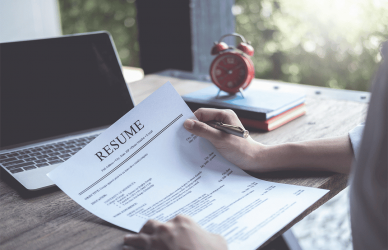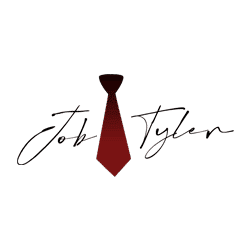“Tell me about yourself” – how to answer this interview question
Many graduates are stumped by this open-ended question, but we will all face it at some point in our careers: “why don’t you start by telling me a little bit about yourself?”
It appears simple, but when it comes down to it, graduates oftenly wonder, what does the interviewer really want to know, and how much should I be ‘telling’?
It is critical to plan your response to this common question in order to be fully prepared on the day. Write down your response and go over it a few times, adding any key points as you go.
It is a good idea to ask your parents, a sibling or a friend to test you afterwards and give you tips on areas for improvement.
Why do employers ask “tell me about yourself”?
Because the question “Tell me about yourself” is so broad, answering it can be a minefield. We’ve discovered that the best way to approach this common graduate interview question is to first understand why an employer asks it.
1. To get up to speed
While you may know your graduate CV like the back of your hand after hours of poring over it, keep in mind that an employer will not be as well-versed.
Remember that your interviewer most likely had a hundred and one other things to consider about in the time between first reviewing your graduate CV and inviting you to interview.
It is your responsibility to bring their attention back to the reason they invited you to interview in the first place.
What you should do: Consider it a short refresher – provide an overview of your graduate CV, including a summary of your degree and any key skills learned, what you’ve been up to since, and what has brought you to the point of wanting this graduate job.
2. To get you talking
The key to interview success isn’t so much what you say as it is how you say it. Whatever graduate job you choose, you must be prepared to interact with a diverse range of people.
This could be anything from presenting new ideas to clients and explaining difficult concepts, to chasing up your colleagues on a project or persuading customers to buy.
All of these situations necessitate that you be confident, clear, and concise – and an interview is the ideal opportunity to demonstrate this. The word ‘concise’ is important here; avoid rambling when answering this interview question; you must keep the employer’s attention throughout.
What you should do: When asked to tell the interviewer about yourself, remember the most important qualities for the job based on your employer research, and then keep yourself in check throughout the interview. Are you talking too fast? Are you mumbling? Do your points make sense? If you get off track, pause, gather your thoughts, and resume – it will make all the difference in an employer’s ears! This is a key part of successfully answering all graduate interview questions.
3. To understand why you’re the best
You made it to the job interview – now it’s time to really shine. You need to grab the interviewer’s attention by dropping in all of your key achievements. When you’re asked the question “Tell me about yourself”, it really is your chance to say as much as you can about your achievements.
The interviewer will often use your response as a springboard for the next question i.e. ask you to elaborate on some of the points you just mentioned – this is a great chance to steer the interview in the direction you want. When you’re doing your prep for graduate interview questions, make sure that you can talk professionally and in detail about yourself.
What you should do: Highlight your key strengths and achievements – especially the areas you’d like to expand on during the interview. You can add emphasis to these points by having a slight pause after each one, before continuing onto the next. Focus on your skills and attributes that match the job description.
Can you tell me about yourself sample answer
Seeing an example answer can help you plan your own responses to common interview questions, and while each graduate’s response will be unique, it is useful to have a good idea of how to structure your response. Here’s how a graduate student applying for a position as a Digital Marketing Assistant might answer the question:
“I’m [first name] from [area], I studied Marketing Communications at Bournemouth University and have recently graduated with a 2.1.
I am keen to pursue a career in digital marketing, having completed my dissertation on ‘The Impact of Digital Marketing on Businesses Today’, for which I analyzed the digital marketing strategies of 10 businesses, giving me a sound understanding of key digital marketing tools and the importance of getting your strategy right.
As well as being part of the marketing society at Uni, I also write a blog in my spare time, educating people about ways in which social media can be used effectively. Juggling this with my university work has strengthened my organization skills, I always plan my week’s work in advance, prioritizing tasks to ensure that I work efficiently to complete everything on time.
Last year I gained work experience within a digital marketing agency which reinforced my desire to get a job in this sector. I love math and have a very analytical mindset so I am keen to build on my SEO and digital analytics knowledge. I think I would really enjoy the job role and I believe I could bring significant value to your team; it’s always easy to market something you’re passionate about!”
What to avoid when answering “what can you tell me about yourself”
- Talking about outdated skills and experience
The employer does not need to know that you were a member of beavers, cubs, and scouts when you were younger; instead, focus on skills and experience gained in the last 5 years.
This will show the employer that you have progressed throughout university, improving your strengths along the way.
- Listing information without explaining
This is one of the common mistakes that many graduates make when telling the interviewer about themselves. Don’t just read from your CV, you don’t want to send the employer to sleep! Make sure you explain key points clearly, demonstrating your passion and enthusiasm.
It might be an idea to prepare some notes with bullet points to ensure that you cover the main points, whilst avoiding relaying exactly what the employer already sees in front of them on your CV.
- Being too personal
Whilst it is important to build a rapport with the interviewer, they don’t need to know your partner just moved to the area and you want too as well. This might suggest you’re not committed to the job itself.
Because this is one of the first questions you are likely to be asked during the interview, try to focus on your work-related skills rather than your personal life. Share your personality with the interviewer, but refrain from sharing personal information.
Towards the end of the interview, after you have answered some more questions, you will be able to make a judgement on how formal or informal the interviewer is. Once you have a better idea of how the interview is going, then you can really let your personality shine!
- Talking for the sake of it
Your response to this interview question should have a clear structure. Having your points scattered around suggests you have a jumbled mind, which does not bode well for the rest of the interview. Although the question “Tell me about yourself” may appear open-ended, remember to keep your response structured and concise.
Take your time answering and try to remain calm.
- Going off point
It is easy to go off topic when answering this interview question. Try to focus on the experience which is directly relevant to the job you’re going for. Don’t lead by saying you’re a shoe maker if you’re sat in an interview for investment banking!
Tip: Win extra points for relating your experiences, both from education and extra-curricular, with things you have learnt about the employer from your research.
Question variations for tell me about yourself
- Please can you talk me through your curriculum vitae?
- Please explain the key areas of your CV
- What would you like me, as the interviewer, to remember about you after today?
- How would you explain yourself to someone?
- Please describe your education and any work experience you’ve had?
- Please tell me about the journey you have taken to get to where you are now
- Could you give me a quick overview of who you are and what you have done to date?
- What can you tell me about yourself?
- Can you tell me about yourself, including examples which are not on your CV?





